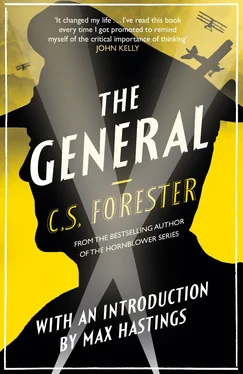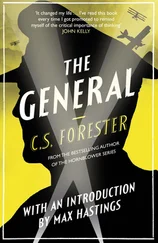The General
C. S. Forester
With an introduction by Max Hastings


Copyright Copyright Introduction Chapter One Chapter Two Chapter Three Chapter Four Chapter Five Chapter Six Chapter Seven Chapter Eight Chapter Nine Chapter Ten Chapter Eleven Chapter Twelve Chapter Thirteen Chapter Fourteen Chapter Fifteen Chapter Sixteen Chapter Seventeen Chapter Eighteen Chapter Nineteen Chapter Twenty Chapter Twenty-One Chapter Twenty-Two Chapter Twenty-Three Chapter Twenty-Four About the Author By the Same Author About the Publisher
William Collins
An imprint of HarperCollins Publishers Ltd.
1 London Bridge Street
London SE1 9GF
www.harpercollins.com
First published in Great Britain by William Collins in 2014
Copyright © C. S. Forester 1936
Introduction © Max Hastings 2014
C. S. Forester asserts the moral right to be identified as the author of this work.
‘The General’ and ‘Base Details’ copyright Siegfried Sassoon, reproduced by kind permission of the Estate of George Sassoon.
A catalogue record for this book is available from the British Library.
This novel is entirely a work of fiction. The names, characters and incidents portrayed in it are the work of the author’s imagination. Any resemblance to actual persons, living or dead, events or localities is entirely coincidental.
All rights reserved under International and Pan-American Copyright Conventions. By payment of the required fees, you have been granted the non-exclusive, non-transferable right to access and read the text of this ebook on-screen. No part of this text may be reproduced, transmitted, down-loaded, decompiled, reverse engineered, or stored in or introduced into any information storage and retrieval system, in any form or by any means, whether electronic or mechanical, now known or hereinafter invented, without the express written permission of HarperCollins ebooks
HarperCollins Publishers has made every reasonable effort to ensure that any picture content and written content in this ebook has been included or removed in accordance with the contractual and technological constraints in operation at the time of publication
Source ISBN: 9780007580057
Ebook Edition © 2014 ISBN: 9780007580064
Version: 2017-09-08
Table of Contents
Cover
Title Page The General C. S. Forester With an introduction by Max Hastings
Copyright
Introduction
Chapter One
Chapter Two
Chapter Three
Chapter Four
Chapter Five
Chapter Six
Chapter Seven
Chapter Eight
Chapter Nine
Chapter Ten
Chapter Eleven
Chapter Twelve
Chapter Thirteen
Chapter Fourteen
Chapter Fifteen
Chapter Sixteen
Chapter Seventeen
Chapter Eighteen
Chapter Nineteen
Chapter Twenty
Chapter Twenty-One
Chapter Twenty-Two
Chapter Twenty-Three
Chapter Twenty-Four
About the Author
By the Same Author
About the Publisher
No warrior tribe in history has received such mockery and contempt from posterity as have been heaped upon Britain’s commanders of the First World War. They are deemed to have presided over unparalleled carnage with a callousness matched only by their incompetence. They are perceived as the high priests who dispatched a generation to death, their dreadful achievement memorialised for eternity by such bards as Siegfried Sassoon:
‘Good morning; good morning!’ the General said
When we met him last week on our way to the line.
Now the soldiers he smiled at are most of ’em dead,
And we’re cursing his staff for incompetent swine.
‘He’s a cheery old card,’ grunted Harry to Jack,
As they slogged up to Arras with rifle and pack.
But he did for them both by his plan of attack.
Two generations later, Sir John French, C-in-C of the wartime British Expeditionary Force on the Western Front, together with his successor Sir Douglas Haig, were caricatured by Alan Clark in his influential though wildly unscholarly 1961 polemic The Donkeys , for which the author belatedly admitted that he had invented the quotation attributed to the Kaiser, describing British troops as ‘lions led by donkeys’. Clark’s book inspired Charles Chilton and Joan Littlewood to create the 1963 satirical musical Oh, What A Lovely War!. In 1989 BBC TV’s Blackadder Goes Forth imprinted on a new generation of viewers a vision of 1914–18’s commanders personified by General Sir Anthony Cecil Hogmanay Melchett, played by Stephen Fry. Here was the mass murderer as comic turn – or, if you prefer, the comic turn as mass murderer.
Yet this was not how most survivors of 1914–18 viewed their leaders in the war’s aftermath, despite gaping emotional wounds left by the slaughters at Neuve Chapelle, Loos, the Somme, Ypres, Passchendaele and elsewhere. Among veterans returning from France, there was anger about the muddle attending demobilisation of Britain’s huge army, which prompted strikes and mutinies; about the lack of a domestic social, moral or economic regeneration such as might offer some visible rewards to justify the war’s sacrifice; about the absence of the ‘homes fit for heroes’ promised by politicians. But until the end of the 1920s, senior officers such as Haig, French, Plumer, Byng and Rawlinson received respect and even homage. The belated victors of the campaign on the Western Front were loaded with titles and honours; painted by Sir William Orpen; granted places of honour at the unveiling of countless memorials, of which the Cenotaph in Whitehall was only the foremost. A million people turned out for Haig’s 1928 London funeral procession, and almost as many for the subsequent ceremonies in Edinburgh.
The public mood began to shift about the time the Depression began. Such accounts of the war as Frederick Manning’s The Middle Parts of Fortune (1929), Edmund Blunden’s Undertones of War (1928), Siegfried Sassoon’s Memoirs of a Fox-Hunting Man (1928) and Memoirs of an Infantry Officer (1930), Robert Graves’s Good-bye to All That (1929) and Erich Maria Remarque’s All Quiet on the Western Front (1929) depicted a protracted agony in pursuit of rival national purposes which allegedly meant little to those who perished in their names, compounded by the brutalism of those who directed the armies.
Even if most veterans – unlike Maynard Keynes and Siegfried Sassoon – retained a belief that the allied cause had been just, people could see for themselves the political chaos and economic wretchedness prevailing across much of the world at the end of the decade following the armistice. The Great War, it seemed, had not merely yielded battlefield horrors of unprecedented scale and intensity; it had also failed to secure any discernible benefit for mankind or even for the victors. In the absence of evidence of Germanic evil remotely matching the 1945 revelation of the Holocaust, by the 1930s a diminishing number of people in the allied nations acknowledged the Kaiser’s empire as a malign and aggressive force, the frustration of whose purposes had been critical for European civilisation. Britain became host to a Peace Movement unrivalled in any other country for its numbers and fervour. Following the Oxford Union’s February 1933 debate, in which a motion was carried by 275 votes to 153 ‘that this House will in no circumstances fight for its King and Country’, many people believed that a new generation of British men had become irredeemably committed to pacifism. In 1934 Madame Tussaud’s waxwork gallery responded to the changed public mood by removing from exhibition its galaxy of allied generals, catalogued as ‘The Men Who Won the War’.
Читать дальше














